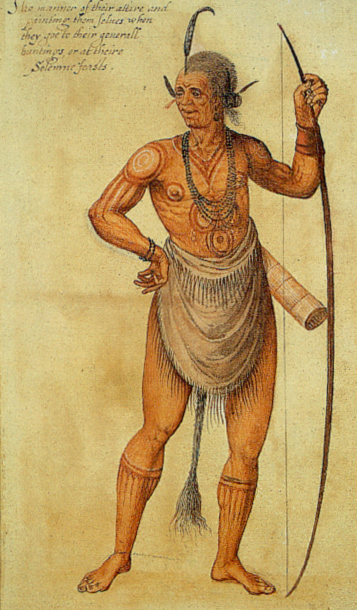Raleigh (Native American) on:
[Wikipedia]
[Google]
[Amazon]
 Raleigh (died 2 April 1589) was a Native American who was among the first to be brought to
Raleigh (died 2 April 1589) was a Native American who was among the first to be brought to  Sir
Sir
-
 Raleigh (died 2 April 1589) was a Native American who was among the first to be brought to
Raleigh (died 2 April 1589) was a Native American who was among the first to be brought to England
England is a country that is part of the United Kingdom. It shares land borders with Wales to its west and Scotland to its north. The Irish Sea lies northwest and the Celtic Sea to the southwest. It is separated from continental Europe ...
from America in the late 16th-century. Living in the home of Sir Richard Grenville
Sir Richard Grenville (15 June 1542 – 10 September 1591), also spelt Greynvile, Greeneville, and Greenfield, was an English privateer and explorer. Grenville was lord of the manors of Stowe, Cornwall and Bideford, Devon. He subsequently ...
in Bideford
Bideford ( ) is a historic port town on the estuary of the River Torridge in north Devon, south-west England. It is the main town of the Torridge local government district.
Toponymy
In ancient records Bideford is recorded as ''Bedeford'', ' ...
, he was the first Native American on record to have a Christian conversion and an English burial site preceding Pocahontas
Pocahontas (, ; born Amonute, known as Matoaka, 1596 – March 1617) was a Native American woman, belonging to the Powhatan people, notable for her association with the colonial settlement at Jamestown, Virginia. She was the daughter o ...
.
Sir Richard Grenville captured the Roanoke Island
Roanoke Island () is an island in Dare County, bordered by the Outer Banks of North Carolina, United States. It was named after the historical Roanoke, a Carolina Algonquian people who inhabited the area in the 16th century at the time of Engli ...
Native American Raleigh (named for Grenville's cousin Sir Walter Raleigh
Sir Walter Raleigh (; – 29 October 1618) was an English statesman, soldier, writer and explorer. One of the most notable figures of the Elizabethan era, he played a leading part in English colonisation of North America, suppressed rebellio ...
) following a skirmish in 1586 and brought him to Bideford. He may have been one of three Native Americans who were captured, remaining in captivity after the two others escaped. Described as a "Wynganditoian", he had his baptism at Saint Mary's Church in Bideford on 27 March 1588.
 Sir
Sir Walter Raleigh
Sir Walter Raleigh (; – 29 October 1618) was an English statesman, soldier, writer and explorer. One of the most notable figures of the Elizabethan era, he played a leading part in English colonisation of North America, suppressed rebellio ...
later corrected the place name Raleigh is said to have originated from, stating that " en some of my people asked the name of that Countrie one of the Savages answered Wingandacon, which is as much to say, as, ''you weare good clothes'', or gay clothes." The mistake may have been corrected by Manteo.Alden T. Vaughan, ''Transatlantic Encounters: American Indians in Britain, 1500-1776'', Cambridge University Press (2006)-
Google Books
Google Books (previously known as Google Book Search, Google Print, and by its code-name Project Ocean) is a service from Google Inc. that searches the full text of books and magazines that Google has scanned, converted to text using optical ...
pg 26 It is not likely that Raleigh was a member of the friendly Hatteras Indians led by Manteo but was probably a member of a tribe allied to Wanchese, who had been involved in several skirmishes with English colonists previously on Roanoke.Alden T. Vaughan, ''Sir Walter Ralegh's Indian Interpreters, 1584-1618'', The William and Mary Quarterly, Vol. 59, No. 2 (Apr., 2002), pp. 341-376
Little is known of Raleigh or why Grenville brought him to Bideford. Grenville was planning another voyage to America and it could have been his intention to take Raleigh back to Roanoke where his local knowledge and native language would have been useful.David Howell, ''The Bideford Heritage Trail'', Pub: Bideford 500 Heritage Group (2011) pg 8 He died from influenza in Grenville's house on 2 April 1589, his interment in the churchyard of Saint Mary's Church in Bideford
Bideford ( ) is a historic port town on the estuary of the River Torridge in north Devon, south-west England. It is the main town of the Torridge local government district.
Toponymy
In ancient records Bideford is recorded as ''Bedeford'', ' ...
taking place five days later. Raleigh was the first Native American to legally have a Christian conversion and a resting place in England.
A record in the Bodleian Library
The Bodleian Library () is the main research library of the University of Oxford, and is one of the oldest libraries in Europe. It derives its name from its founder, Sir Thomas Bodley. With over 13 million printed items, it is the sec ...
at Oxford
Oxford () is a city in England. It is the county town and only city of Oxfordshire. In 2020, its population was estimated at 151,584. It is north-west of London, south-east of Birmingham and north-east of Bristol. The city is home to the Un ...
dated 1792 states that Raleigh was not buried in the church crypt, but in the Churchyard. As this record pre-dates the Victorian
Victorian or Victorians may refer to:
19th century
* Victorian era, British history during Queen Victoria's 19th-century reign
** Victorian architecture
** Victorian house
** Victorian decorative arts
** Victorian fashion
** Victorian literature ...
rebuilding of St Mary's church in the mid-1860s it is probable that his now unmarked grave lies somewhere there still.
References
{{DEFAULTSORT:Raleigh (Native American) 1589 deaths 16th-century Native Americans Native American people from North Carolina American emigrants to England Roanoke Island Native American Christians Converts to Anglicanism European colonization of North America